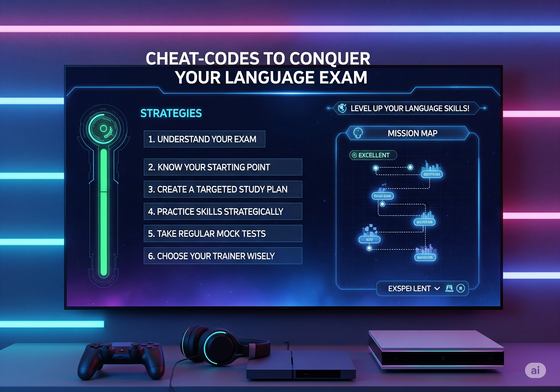Your Roadmap to Acing Any Language Proficiency Test
By Admin | Date: August 22, 2025 | Category: Exams, Preparation, Language Learning | Reading Duration: 8 min

Taking a language exam, whether it's IELTS, TOEFL, Goethe, DELF, or any other, can feel like a huge challenge. These tests are important for university admissions, job opportunities, or even immigration. But with the right approach and a solid preparation plan, you can face your exam with confidence and achieve the score you need. This guide will give you a clear, step-by-step roadmap to help you prepare effectively.
Step 1: Understand Your Exam
Understanding the exam is half the battle won. The first and most crucial step is to fully understand the specific test you're taking.
- Format: How many sections are there (Reading, Writing, Listening, Speaking)? What types of questions are asked in each?
- Timing: How much time is given for each section? This is vital for time management during the actual test.
- Scoring: How is the exam graded? What are the passing scores or target band/level you need?
- Materials: What official study guides, sample papers, or online resources does the test provider offer?
For example, IELTS and TOEFL are widely accepted English proficiency tests, while the Goethe-Institut offers certificates for German proficiency. Research your specific exam thoroughly on its official website.
Step 2: Know Your Starting Point
Before you dive into studying, take a diagnostic or mock test under timed conditions. This will give you a clear picture of your current strengths and weaknesses across all language skills.
- Which sections did you perform well in?
- Which sections need the most improvement?
- Was time management an issue?
This assessment is key to creating a focused study plan that targets your specific needs.
Step 3: Create a Targeted Study Plan
A well-structured study plan is your secret weapon.
- Set Realistic Goals: Break down your overall goal into smaller, achievable daily or weekly targets (e.g., "Practice IELTS Speaking Part 2 for 30 minutes daily").
- Allocate Time: Dedicate more time to your weaker areas, but don't neglect your stronger ones.
- Schedule Regularly: Consistency is key. Even short, daily study sessions are more effective than infrequent long ones.
- Use Varied Resources: Don't just stick to textbooks. Integrate podcasts, news articles, movies, and conversations into your study.
Step 4: Practice Each Skill Strategically
Focus on improving each of the four core skills:
- Reading: Practice speed reading, identifying main ideas, and understanding specific details. Read diverse materials like news, academic articles, and literature in your target language.
- Listening: Listen actively to various accents and speeds. Use podcasts, videos, and official listening samples. Don't just listen; try to summarize or answer questions afterward.
- Writing: Practice different types of essays or responses required by your exam. Pay attention to grammar, vocabulary, coherence, and structure. Get feedback on your writing.
- Speaking: This is often the most challenging. Practice speaking daily with a partner, tutor, or even by recording yourself. Work on fluency, pronunciation, grammar, and vocabulary usage.
Step 5: Take Regular Mock Tests and Review
Simulate the exam environment as often as possible.
- Full-Length Tests: Take complete mock tests under strict timed conditions to build stamina and manage stress.
- Analyze Mistakes: Don't just look at your score. Go through every incorrect answer to understand why it was wrong and learn from it.
- Seek Feedback: If possible, get an experienced tutor or language expert to review your speaking and writing sections.
The Tutor Advantage: Boosting Your Success
While self-study is important, the guidance of a good language tutor can dramatically increase your chances of success. A skilled tutor offers personalized attention that general courses or apps can't provide. They can:
- Identify Specific Weaknesses: Pinpoint areas where you struggle and create targeted exercises.
- Provide Tailored Feedback: Give detailed, constructive criticism on your speaking and writing, which is crucial for improvement.
- Offer Exam Strategies: Share insider tips and techniques specific to your exam's format and question types.
- Build Confidence: Provide a supportive environment for practicing speaking and overcoming anxiety.
- Keep You Accountable: Regular sessions and assignments help maintain your motivation and progress.
Choosing your tutor is a careful decision. Look for someone with proven experience in preparing students for your specific exam (e.g., IELTS or Goethe), positive testimonials, and a teaching style that matches your learning preferences. A great tutor is not just a teacher but a mentor who can guide you effectively towards your language certification goals.
---Insider Tips for Exam Day Success
- Rest Up: Get a good night's sleep before the exam.
- Eat Well: A balanced meal will keep your energy levels stable.
- Stay Calm: Practice deep breathing or mindfulness techniques to manage anxiety.
- Read Instructions Carefully: Don't rush this part; understanding what's expected is half the battle.
- Manage Your Time: Stick to your practiced timings for each section. If stuck, move on and come back if you have time.
Preparing for a language exam is a journey that requires dedication and smart strategies. By following this step-by-step guide, you'll build the skills and confidence needed to conquer your exam and open new doors to your future. Good luck!
⭐ Quick Takeaway ⭐
| Step | Action | Benefit |
|---|---|---|
| 1. Understand Exam | Research format, timing, scoring. | Know exactly what to expect. |
| 2. Know Your Level | Take a diagnostic/mock test. | Identify strengths and weaknesses. |
| 3. Create Plan | Set SMART goals, allocate time. | Stay organized and focused. |
| 4. Practice Skills | Strategically improve R, W, L, S. | Build comprehensive language ability. |
| 5. Mock & Review | Take full mock tests, analyze mistakes. | Improve performance and confidence. |




